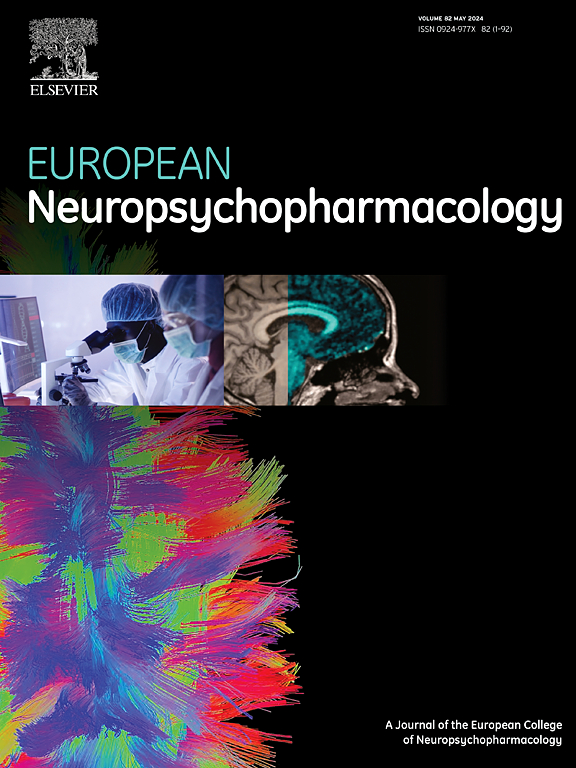基因塑造的环境:积极的和唤起性的基因-环境相关性在心理健康中的作用
IF 6.7
2区 医学
Q1 CLINICAL NEUROLOGY
引用次数: 0
摘要
影响心理健康的环境和生活方式因素。社会经济地位,饮食,睡眠,家庭环境,活动都是遗传的。这就产生了基因-环境相关(rGE)。rGE可以对遗传效应大小、孟德尔随机化研究和基因-环境相互作用估计产生偏倚。rGEs还可以揭示遗传风险表达的新机制。在本次研讨会上,我们介绍了几项研究,利用数量遗传学和基于gwas的方法,在世界各地的不同队列中探索(积极的和令人回味的)rGE。Margherita Malanchini将讨论影响儿童和青少年内化和外化问题的不同形式的基因-环境相互作用。在来自双胞胎早期发展研究的3337名16岁儿童中,研究了精神病理学(G)、环境暴露(E)、它们的加性效应(G+E)、相互作用(G × E)和相关性(rGE)的13个多基因得分的影响。结果显示了GxE和rGE,并表明个体可能寻求或创造符合其遗传倾向的环境,这使得G × E的解释变得复杂。接下来,Luciana Tovo-Rodrigues将探讨遗传责任和童年虐待对成年早期ADHD症状的共同贡献的最新证据。分析基于2004年佩洛塔斯出生队列,这是巴西的一项具有里程碑意义的纵向研究,从出生开始跟踪了4231个人。研究结果表明,ADHD多基因得分较高的个体更有可能经历过不利的童年环境。中介分析提示了一种唤起性的rGE机制。第三,石英杰将展示纵向ABCD研究的结果,该研究考察了遗传、家族、几十种生活方式和环境因素如何单独或集体地影响青少年的心理健康。生活方式,尤其是睡眠,对内在化和外在化问题有最大的独特影响,而家庭和学校环境对外在化行为尤为重要。纵向分析显示,生活方式/环境与心理健康特征之间存在广泛的双向关系。第四,梅克·巴特尔斯将介绍两项关于荷兰双登记的研究,这些研究集中证明了健康的遗传倾向有助于塑造支持性环境,这与活跃的rGE一致。一项大规模的纵向调查显示,青少年的幸福感越高,成年早期的社会心理状况就越好,家庭内部的影响越弱,表明环境选择受基因影响。在第二项生态瞬时评估研究中,具有较高瞬时幸福感的个体随后经历的社会不匹配较少,这表明情感状态塑造了社会互动。总之,这些来自不同分析技术和不同数据集的发现表明,基因驱动的行为差异如何积极、令人回味地、相互地塑造我们的环境和心理健康。这为遗传机制增加了一层复杂性,并可能为改变遗传影响以有利于心理健康的行为和政策干预提供了转化潜力的新层面。这一点,以及这项工作的其他含义,将是马修·凯勒(Matthew Keller)领导的研讨会讨论的重点。本文章由计算机程序翻译,如有差异,请以英文原文为准。
GENETICALLY SHAPED ENVIRONMENTS: THE ROLE OF ACTIVE AND EVOCATIVE GENE-ENVIRONMENT CORRELATIONS IN MENTAL HEALTH
Environmental and lifestyle factors influencing mental health—e.g. SES, diet, sleep, home environment, activieties—are heritable. This gives rise to gene-environment correlation (rGE). rGE can bias genetic effect sizes, Mendelian randomisation studies, and gene-environment interaction estimates. rGEs can also reveal new mechanisms through which genetic risk is expressed. In this symposium we present several studies that explore (active and evocative) rGE using quantitative genetics and GWAS-based approaches, in different cohorts across the world.
Margherita Malanchini will address different forms of gene-environment interplay influencing internalising and externalising problems in childhood and adolescence. The effects of 13 polygenic scores for psychopathology (G), a combination of environmental exposures (E), their additive effect (G+E), interaction (G × E), and correlation (rGE) were examined in 3,337 16-year-olds from the Twins Early Development Study. Results indicated both GxE and rGE, and suggested that individuals may seek or create environments that align with their genetic propensities, which complicates the interpretion of G × E.
Next, Luciana Tovo-Rodrigues will explore recent evidence on the joint contribution of genetic liability and exposure to childhood maltreatment to ADHD symptomatology in young adulthood. Analyses were based on the 2004 Pelotas Birth Cohort, a landmark longitudinal study in Brazil that followed 4,231 individuals from birth. Findings indicated that individuals with higher polygenic scores for ADHD are more likely to have experienced adverse childhood environments. Mediation analysis suggested an evocative rGE mechanism.
Third, Yingjie Shi wil present findings from the longitudinal ABCD study examining how genetic, familial, and dozens of lifestyle and environmental factors contribute—individually and collectively—to adolescent mental health. Lifestyle, especially sleep, had the largest unique influence on internalizing and externalizing problems, while family and school environments were particularly important for externalizing behaviors. Longitudinal analyses revealed widespread bidirectional relationships between lifestyle/environment and mental health traits.
Fourth, Meike Bartels will present two studies of the Netherlands Twin Register converging on evidence that genetic predisposition for wellbeing contributes to shaping supportive environments, consistent with active rGE. A large-scale longitudinal survey showed that higher teenage wellbeing predicts better psychosocial outcomes in early adulthood, with attenuated within-family effects suggesting genetically influenced environmental selection. In a second, Ecological Momentary Assessment study, individuals with higher momentary wellbeing experienced less subsequent social mismatch, indicating that affective states shape social interactions.
Together, these findings from different analyses techniques and separate datasets show how genetically driven behavioural differences can actively, evocatively and reciprocally shape our environments and mental wellbeing. This adds a layer of complexity to genetic mechanisms, and possibly a new dimension of translational potential for behavioural and policy interventions to alter genetic influences to the benefit of mental health. This, and other implications of this work will be the focus of the symposium's discussion, led by Matthew Keller.
求助全文
通过发布文献求助,成功后即可免费获取论文全文。
去求助
来源期刊

European Neuropsychopharmacology
医学-精神病学
CiteScore
10.30
自引率
5.40%
发文量
730
审稿时长
41 days
期刊介绍:
European Neuropsychopharmacology is the official publication of the European College of Neuropsychopharmacology (ECNP). In accordance with the mission of the College, the journal focuses on clinical and basic science contributions that advance our understanding of brain function and human behaviour and enable translation into improved treatments and enhanced public health impact in psychiatry. Recent years have been characterized by exciting advances in basic knowledge and available experimental techniques in neuroscience and genomics. However, clinical translation of these findings has not been as rapid. The journal aims to narrow this gap by promoting findings that are expected to have a major impact on both our understanding of the biological bases of mental disorders and the development and improvement of treatments, ideally paving the way for prevention and recovery.
 求助内容:
求助内容: 应助结果提醒方式:
应助结果提醒方式:


